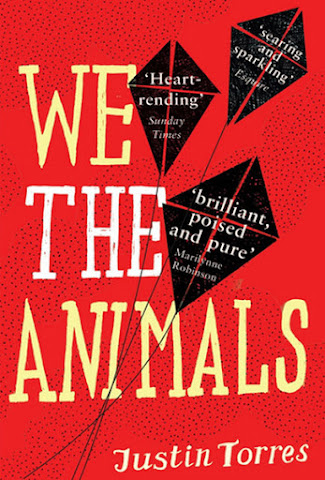#CBR12 Review #24: We the Animals by Justin Torres
A friend actually recommended that I see the film We the Animals recently (which I haven’t gotten around to watching yet, whoops!), so upon finding out that it was an adaptation of a novel, I decided to get into the book. It is loosely based on the author’s own life, and reads like a childhood memoir of sorts. It is also very brief, and this works well in the majority of the novel to paint a picture of memories for the protagonist, but ultimately does a disservice to the story being told in the last quarter or so.
The story is told from the POV of a young, unnamed boy living with his two older brothers, Manny and Joel, and his two parents in upstate rural New York during the 1980s. The boys are of mixed Puerto Rican and white heritage, and through a series of little vignettes, we see how close the 3 brothers are, with the narrator symbolizing how they view themselves as wild animals and get into all kinds of wild schemes. But we also see glimpses of the abuse that their mother receives at the hands of their father; there appears to still be love in this relationship, but the boys’ mother is clearly unhappy and longing for a different life. This is also due in part to the lengths that the family goes through in order to stay afloat over the years, with the parents taking on jobs with undesirable hours. As time goes on, we start to see how the narrator is perhaps diverging from his brothers in certain ways, and is starting to recognize himself as individual and different from them (previously always a “we”, and now an “I”). In fact, near the end of the novel there is a shift in time, and we see the family years later, with the narrator seeing an even greater and firmly defined difference between himself and his family.
The majority of this novel delivers beautiful moments that feel so intimate and tell so much, from the point of view of a young boy. There is a richness to the picture being painted of this particular childhood, and the moments chosen to linger on are very pointed. However, the jump in time near the end of the novel didn’t work for me. It could have been a years later conclusion to wrap things up and show how time has resulted in the emerging differences between the boys to solidify, but it’s not quite that. In fact, it introduces a new subject and important phase for this family to go through, which would have been a strong Part 2 type addition to the novel, yet it feels like this moment is really just trying to wrap up the story. It’s stuck in a little space of not short enough to be an epilogue, but not long enough to be a new act on its own; it’s far too brief to accommodate the new issues being presented. So that begs the question as to whether it would have made more sense to simply remain in the childhood memories of the novel, as they drew such a meaningful picture? Perhaps. There definitely needed to be some kind of wrap up, or some kind of lead out of this particular period of life more strongly established, but I personally think that would have made more sense for the end of this novel than what was tacked on to the end.
So overall, We the Animals is an intimate and touching portrayal of a loving but troubled family life in the lower class. Although there are some hiccups along the way and the novel in some ways does not feel entirely concluded, there is something to be said for brevity and the purposeful selection of time and moments in a life to breathe life into a setting and characters.
[Visit the Cannonball Read main site!]




Comments
Post a Comment